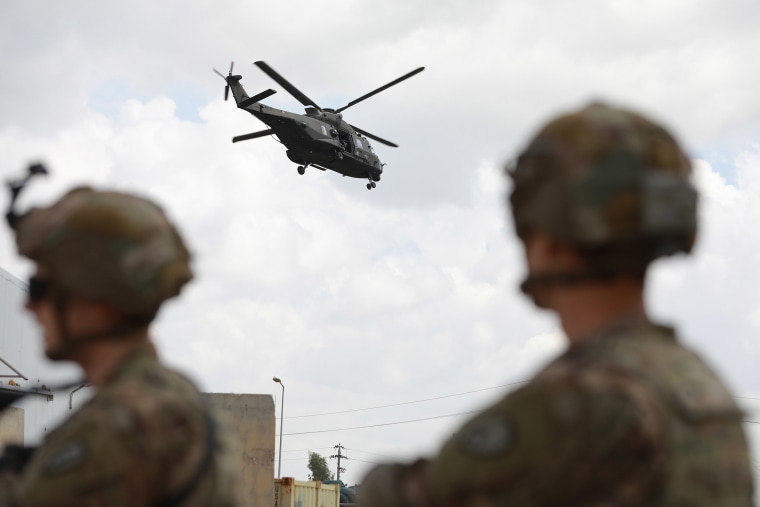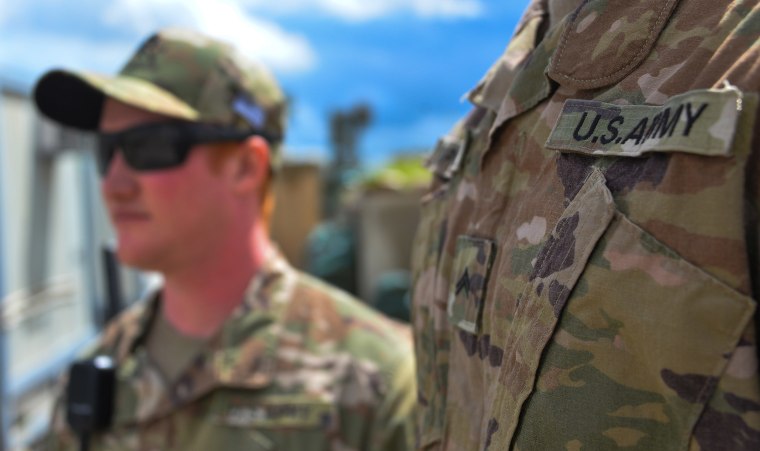WASHINGTON — The Trump administration will temporarily draw down staff from the American Embassy in Baghdad as the fast-approaching anniversary of the U.S. strike on Iranian Gen. Qassem Soleimani brings concerns of retaliation, two U.S. officials told NBC News on Wednesday.
According to one of the officials, the change was temporary, although they did not say how long the reduction would last. Both officials spoke to NBC News on the condition of anonymity.
The exact number of diplomats to be withdrawn from the embassy was not immediately clear but a former senior U.S. diplomat with experience in Iraq said they had been told a significant drawdown was planned. The diplomatic pullback was first reported by The Washington Post.
U.S. Ambassador Matthew Tueller confirmed Thursday that there would be a “temporary reduction of staff numbers” but said he would continue to carry out his normal duties from the embassy and would do so with the support of a “core team” of American diplomats and advisors to the Iraqi military.
“I want to let all our Iraqi friends know that our commitment to Iraq and the Iraqi people is as strong as ever,” he said in a video statement delivered in front of a Christmas tree and posted on the U.S. embassy’s Facebook page.
“The important work we're doing here in Baghdad is continuing on the full breadth of our relationship from security to economics and from human rights to Covid assistance.”
Tueller said he would be in Baghdad for the “foreseeable future” and that the embassy remains open.
The State Department earlier did not confirm the reduction, telling NBC News that the department does not comment on the details of staffing adjustments.
"The State Department continually adjusts its posture at embassies and consulates throughout the world in line with its mission, the local security environment, the health situation, and even the holidays," an official said, speaking on behalf of the agency.
"Ensuring the safety of U.S. government personnel, U.S. citizens and the security of our facilities, remains our highest priority."
Soleimani was the leader of Iran's elite, secretive Quds Force and was killed by a U.S. drone strike on Jan. 3. His death prompted outrage in Iran, which retaliated with strikes against U.S. troops in Iraq.
The U.S. mission in Iraq has already been working under a reduced diplomatic staff since the start of the Trump administration.
Iraqi Foreign Ministry official spokesman Ahmed Al-Sahaf declined to comment on Thursday.
Since U.S. troops invaded Iraq in 2003 and toppled Saddam Hussein's regime, majority Shiite Iraq has struggled to balance its relations with the U.S. and powerful Shiite-ruled neighbor Iran. American troops left in 2011, but they returned in 2014 after the Islamic State militant group overran large parts of the country.
Many Shiite militias that helped quell ISIS violence have been integrated into the Iraqi armed forces, but they have also grown more powerful politically, as well as militarily while retaining strong ties to Iran.
In 2018, Secretary of State Mike Pompeo closed the U.S. Consulate in Basra, in the south of the country, citing the threat posed by Iranian-backed proxies. In May 2019, after a series of rocket attacks were launched toward the U.S. embassy in Baghdad, the State Department ordered the departure of "nonemergency" personnel from Iraq.
Download the NBC News app for breaking news and politics
Attacks by militias on U.S. facilities have largely continued and Pompeo has threatened the full withdrawal of U.S. diplomats from the embassy.
"The United States will not tolerate threats to our men and women serving abroad and we will not hesitate to take any action we deem necessary to keep our personnel safe," a State Department spokesperson said in late September.
"It is unacceptable for Iran-backed groups to launch rockets at our embassy, attack American and other diplomats, and threaten law and order in Iraq."
Critics, however, have blasted Pompeo for scaling back the U.S. diplomatic presence in Baghdad and threatening to close the American embassy, accusing the White House of ceding influence in Iraq and handing Iran a long-sought strategic victory.

Tensions in the region worsened on Friday after the killing of one of Iran's top nuclear scientists, Mohsen Fakhrizadeh.
Days after the attack, Iran Supreme Leader Ayatollah Ali Khamenei warned there would be "definitive punishment" for those who gave the order. Foreign Minister Mohammad Javad Zarif and other senior officials have pointed the finger at Israel.
Israel has not commented on the accusations.


